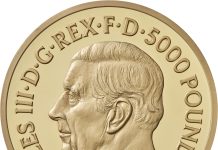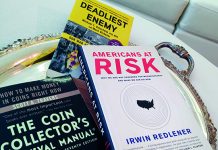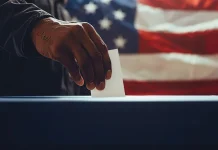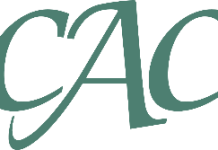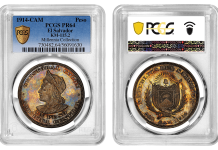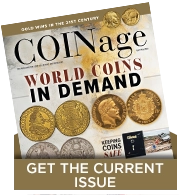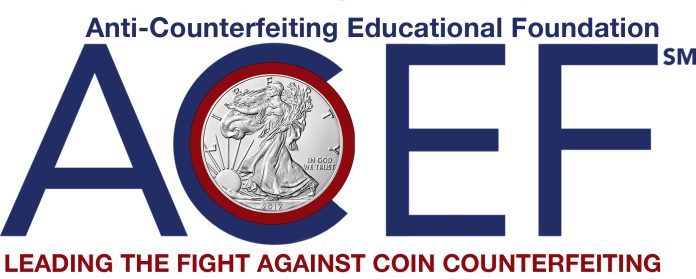
The Anti-Counterfeiting Educational Foundation (ACEF) has joined a national coalition comprised of more than 20 major industries seeking legislation to make e-commerce platforms responsible for ensuring that vendors on their platforms do not sell counterfeits products.
“Current U.S. laws and law enforcement’s ‘whack-a-mole’ approach have proven to be no match for the sellers of counterfeit products on e-commerce platforms. It’s time to join forces and use our collective efforts to bring about the changes needed to shut down criminal access to the U.S. marketplace,” said ACEF President John Albanese. “ACEF enthusiastically endorses the SHOP SAFE Act coalition’s efforts and we pledge to inform and enlist the coin industry and numismatic collector community’s support for this important mission,” Albanese added.
SHOP SAFE is an acronym for “Stopping Harmful Offers on Platforms by Screening Against Fakes in E-Commerce.”
The Shop Safe Act has bipartisan support in both the U.S. Senate and the House of Representatives. It received a public hearing in the Senate during the 118th Congress. However, it did not receive a floor vote in either chamber. Bipartisan sponsors have pledged to re-introduce bills in both chambers when the new Congress convenes in January 2025 and push to make the legislation become law in 2025.
Once enacted, the SHOP SAFE Act will require e-commerce platforms to engage in best practices for screening and vetting sellers and goods, address repeat counterfeiter sellers, and ensure that consumers have relevant information available to them, or the e-commerce platform could be held liable for the sale of counterfeit and illicit products that harm consumers.
The SHOP SAFE Act will be complementary to the INFORM Consumers Act that took effect on June 27, 2024. It requires online marketplaces to collect, verify, and disclose certain information about “high-volume third-party sellers.” Coalition leaders note that together, these laws will begin to stem the influx of illicit products and safeguard consumers from the alarming dangers of counterfeits that extend across industries.
Kari Kammel, Director and Senior Academic Specialist, Center for Anti-Counterfeiting and Product Protection, at Michigan State University testified before a Senate subcommittee hearing Oct. 3., 2023, about the economic harm of counterfeit products.
Kammel noted: “The volume of counterfeits is staggering but also difficult to measure for a variety of reasons.
“First, it is an illicit activity that is often focused on deception.”
“Second, the most accurate data we have is from seizure data. The U.S. Customs and Border Protection’s Intellectual Property Rights Seizure Statistics report for the 2021 fiscal year reported that CBP had 102,490 seizures with an estimated manufacturer’s suggested retail price (MSRP) of over $3.3 billion. The size of the problem is often calculated based on seizure data, or takedown data, which does not fully reflect the universe of counterfeit goods.
“Third, data sharing between brands, platforms, law enforcement, and academia has always been a struggle. However, despite these limitations, estimates of counterfeiting profits globally by Global Financial Integrity state that it is financially the largest criminal enterprise in the world, approximately $923 billion to $1.13 trillion a year—a higher amount than either drugs ($426-652 billion) or human trafficking ($150.2 billion). Financially, counterfeit goods impact national economies; counterfeit and pirated goods in international trade have been estimated to amount to as much as USD 464 billion in 2019, or 2.5% of world trade that year.”
In addition to ACEF, the coalition is comprised of industry organizations such as the Alliance for Automotive Innovation, American Apparel & Footwear Association (AAFA), Association of Home Appliance Manufacturers (AHAM), Automotive Anti-Counterfeiting Council (A2C2), Communications Cable & Connectivity Association (CCCA), Consumer Healthcare Products Association (CHPA), Footwear Distributors & Retailers of America (FDRA), Halloween & Costume Association, MEMA, Partnership for Safe Medicines, The Vehicle Suppliers Association, Personal Care Products Council (PCPC), The Alliance for Safe Online Pharmacies (ASOP), The Toy Association, and the Transnational Alliance to Combat Illicit Trade (TRACIT).
ACEF’s Board of Directors include: John Albanese, President; Barry Stuppler, Vice President; Ian Russell, Treasurer; and Members Don Bonser, Brett Charville, John Dannreuther, David McCarthy, Don Ketterling, Mary Sauvain, Dr. Ute Wartenberg Kagan, Fred Weinberg, and Reid Wolf. Beth Deisher is Executive Director.
For additional information about ACEF’s programs and work in combatting counterfeiting of numismatic items, visit www.acefonline.org

